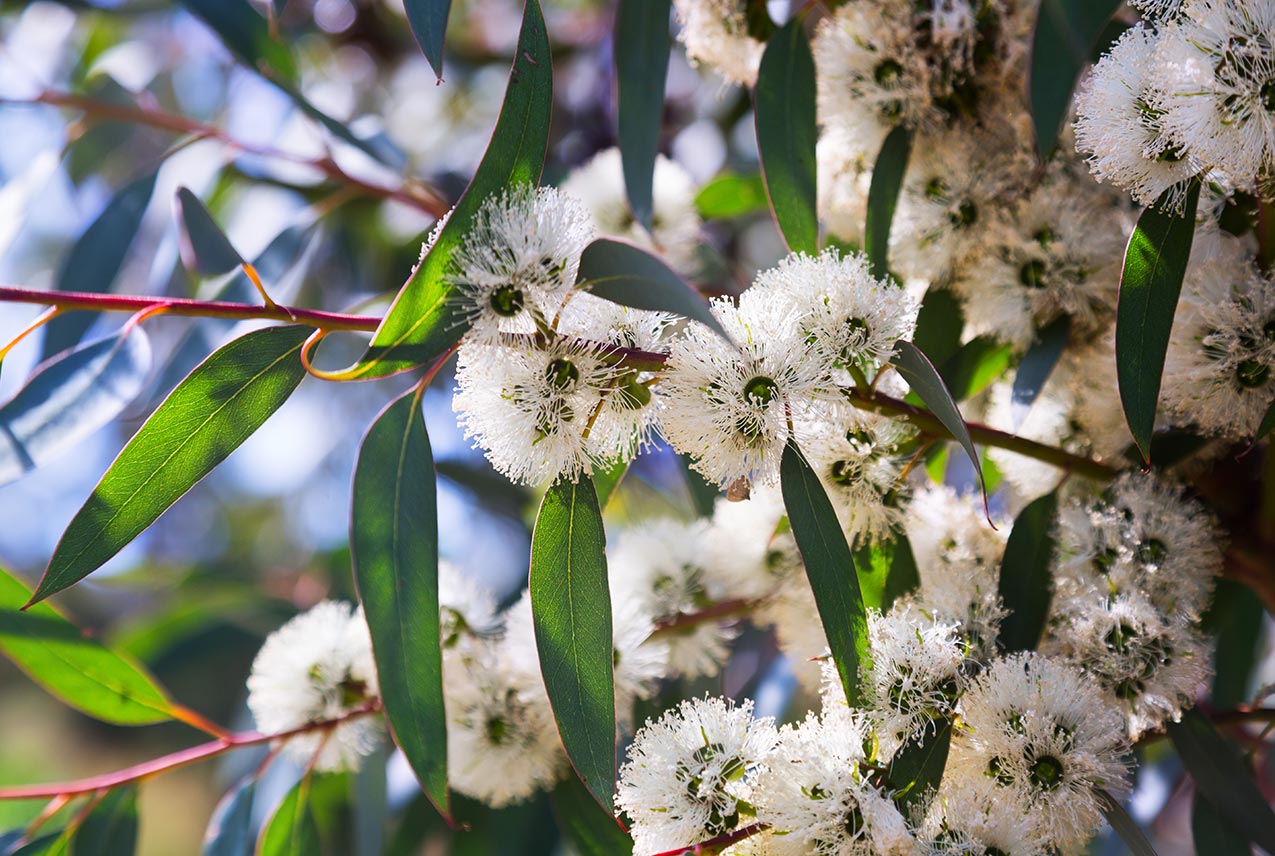Eucalyptus
Eucalyptus globulus
Eucalyptus is a tall evergreen tree native to Tasmania. It is the most important genus of trees found in the Australian forests comprising approximately 75% of all of the trees. Today, most commercially grown trees grow in the Mediterranean and subtropical regions, including Spain and Morocco. The leaves and oil of the eucalyptus plant have long been used for medicinal purposes. Eucalyptus oil consists of the volatile, or essential oil that is distilled from the fresh leaves and branch tops of the eucalyptus plant. There are several species of eucalyptus; however the primary one used medicinally is the globulus species. Some are the species are the size of an ornamental shrub, and some grow to be enormous trees. The type of eucalyptus that is most often used medicinally (globulus) is called blue gum or Australian fever tree. It can grow as high as 230 feet. It has 4 - 12 inch leaves which are dark green and shiny. Its outer blue-gray bark peels to reveal an inner cream-colored bark. Topical ointments containing eucalyptus oil have been used in traditional Aboriginal medicine to support wound healing. Various uses of eucalyptus have spread to other traditional systems around the globe, including Chinese, Indian (Ayurvedic), and Greco-European systems over the past centuries. The French government planted eucalyptus trees in Algeria in 1857. In just five years the trees turned a once marshy land where they were planted, into a drier region, which ultimately reduced the mosquito habitat, giving the eucalyptus the name “fever tree.” The trees went on to be planted in other areas. During the 19th century in England, eucalyptus oil was used in hospitals to clean urinary catheters. Many studies later revealed that eucalyptus oil contains substances with microbial properties, confirming the British use as a cleaning agent.
What is Eucalyptus Used For?
Studies have found that eucalyptus oil acts to support normal expectoration in the respiratory passages, and acts to support healthy microbial balance. The leaves are also believed to help support normal levels of inflammation and support the body during a fever. In addition to oral use, topical ointments often contain eucalyptus leave oil and are applied to the nose and chest for support during times of occasional congestion.

Traditional Health Benefits of Eucalyptus

Additional Information on this Herb
Essential oils such as cineol (sometimes referred to as eucalyptol), and pinene. It also contains cuminaldehyde, aromadendrene, flavonoids, and tannins. The “gum” material that oozes from knots in eucalyptus trees is called kino and contains tannins.
Leaves and essential oils
1.)De Vincenzi M, Silano M, De Vincenzi A, et al. Constituents of aromatic plants: eucalyptol. Fitoterapia 2002;73:269-75 2.)https://www.itis.gov/servlet/SingleRpt/SingleRpt?search_topic=TSN&search_value=27189#null 3.)González-Burgos E et al. Antioxidant activity, neuroprotective properties and bioactive constituents analysis of varying polarity extracts from Eucalyptus globulus leaves. J Food Drug Anal. 2018 Oct;26(4):1293-1302. doi: 10.1016/j.jfda.2018.05.010. Epub 2018 Jun 18. 4.)Goodger JQ et al. Foliar Essential Oil Glands of Eucalyptus Subgenus Eucalyptus (Myrtaceae) Are a Rich Source of Flavonoids and Related Non-Volatile Constituents. PLoS One. 2016 Mar 15;11(3):e0151432. doi: 10.1371/journal.pone.0151432. eCollection 2016. 5.)Ait-Ouazzou A, et al. Chemical composition and antimicrobial activity of essential oils of Thymus algeriensis, Eucalyptus globulus and Rosmarinus officinalis from Morocco. J Sci Food Agric. 2011 Nov;91(14):2643-51. doi: 10.1002/jsfa.4505. Epub 2011 Jul 18. 6.)Amakura Y et al. Marker constituents of the natural antioxidant Eucalyptus leaf extract for the evaluation of food additives. Biosci Biotechnol Biochem. 2009 May;73(5):1060-5. Epub 2009 May 7.
Not for use during pregnancy or lactation. If you have a medical condition or take pharmaceutical drugs please consult your doctor prior to use.
- This information in our Herbal Reference Guide is intended only as a general reference for further exploration, and is not a replacement for professional health advice. This content does not provide dosage information, format recommendations, toxicity levels, or possible interactions with prescription drugs. Accordingly, this information should be used only under the direct supervision of a qualified health practitioner such as a naturopathic physician.
Popular Herbs
Our Herbal Reference Guide lets you enhance your relationship with herbs by giving you a comprehensive profile of each plant.
We're sorry, there were no result found for Popular Herbs.